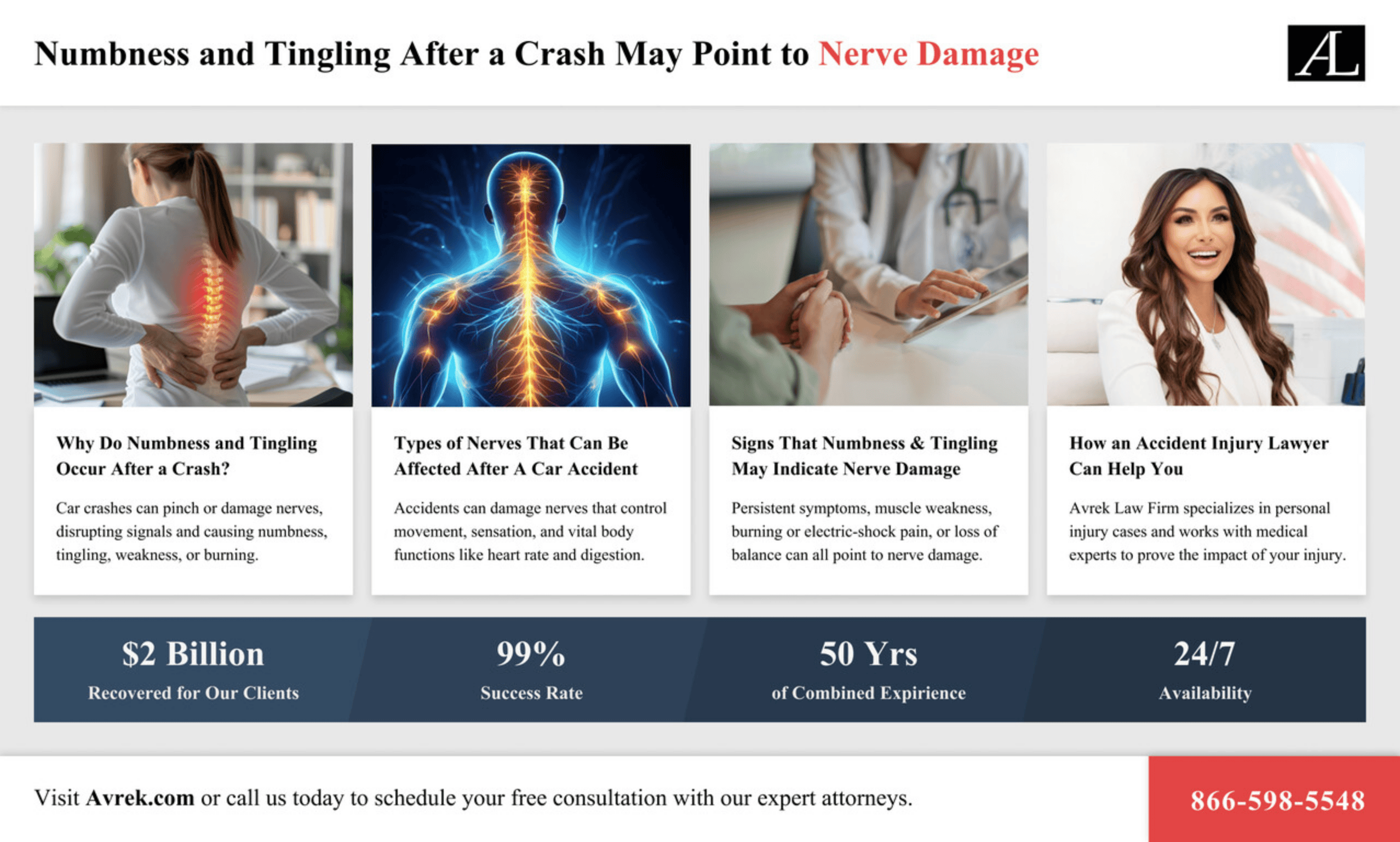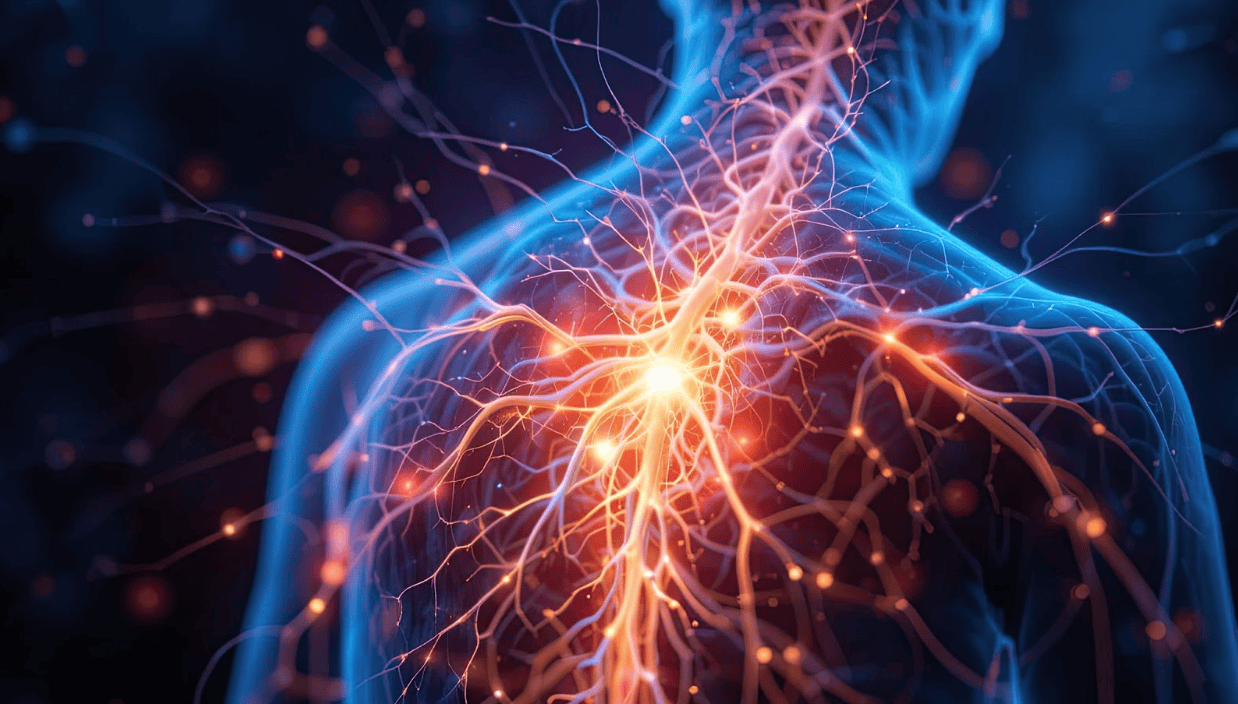
If you have experienced numbness or tingling after a car accident, these symptoms could be signs of nerve damage. Nerve injuries are common but often overlooked consequences of motor vehicle collisions. These sensations might start mild but can worsen over time, interfering with your daily activities, work, and overall quality of life. If you or a loved one are facing these symptoms after a crash, it is critical to seek medical care and consult with an experienced accident injury lawyer who can help protect your rights and pursue the compensation you deserve.
Why Do Numbness and Tingling Occur After a Crash?
Car accidents expose the body to sudden forces that can injure nerves directly or indirectly. Nerves can become compressed, stretched, bruised, or even severed during impact. Common causes of nerve damage in crashes include:
- Whiplash injuries: Sudden neck movements can stretch or pinch nerves.
- Herniated or bulging discs: Discs in the spine can press on nerve roots.
- Fractures or dislocations: Broken bones may impinge on nerves.
- Soft tissue swelling and inflammation: Can compress nerves in tight spaces.
These types of injuries disrupt the normal transmission of signals between the brain, spinal cord, and body. As a result, you might feel numbness, tingling, burning, or weakness in affected areas.

What Is Peripheral Neuropathy?
Peripheral neuropathy refers to a variety of conditions involving damage to the peripheral nervous system, which connects the brain and spinal cord to the rest of the body. This extensive network of nerves carries sensory information like touch, temperature, and pain, controls voluntary muscle movements, and regulates essential involuntary functions such as heartbeat and digestion.
When peripheral nerves are damaged, they fail to send or receive signals properly. This can cause symptoms such as numbness, tingling, muscle weakness, pain, and coordination problems. The National Institute of Neurological Disorders and Stroke (NINDS) reports that peripheral neuropathy affects millions of Americans and can result from diabetes, autoimmune disorders, infections, cancer treatments, inherited diseases, and trauma—including car accidents.
Peripheral neuropathy can affect:
- Motor nerves: Control voluntary movements like walking or grasping.
- Sensory nerves: Send sensations such as touch, pain, or temperature.
- Autonomic nerves: Regulate automatic body functions such as digestion and heart rate.
Understanding peripheral neuropathy helps clarify why numbness and tingling after a crash could be signs of a serious nerve injury.
Signs That Numbness and Tingling May Indicate Nerve Damage
Not all numbness or tingling means nerve damage, but certain symptoms raise concern, especially after a car accident. Watch for:
- Persistent or worsening numbness or tingling.
- Weakness or loss of strength in limbs.
- Burning, stabbing, or electric shock-like pain.
- Loss of balance or coordination.
- Symptoms that spread or affect multiple areas.
If you experience these signs, a prompt evaluation by a healthcare provider is crucial. Early diagnosis and treatment can help prevent permanent nerve damage and disability.
How an Accident Injury Lawyer Can Help You
Nerve injuries caused by auto accidents often require extensive medical care and can result in significant disability, lost wages, and diminished quality of life. Dealing with insurance companies and complex legal issues on your own can be overwhelming.
At Avrek Law Firm, our dedicated accident and injury attorneys are experienced in personal injury cases involving nerve damage and related injuries. We understand the challenges you face and push to ensure you receive compensation for:
- Medical expenses, including ongoing treatment and rehabilitation.
- Lost income and diminished earning capacity.
- Pain, suffering, and emotional distress.
- Long-term care needs in severe cases.
Our team works closely with medical experts to document your injury fully and build a strong case. As a trusted auto injury attorney, our lawyers handle communication with insurance companies, so you can focus on healing.
When Should You Contact Avrek Law Firm?
If you or someone close to you experiences numbness, tingling, or other signs of nerve damage after a car crash, do not delay. These symptoms can worsen without treatment and have life-altering consequences.
You should reach out to Avrek Law Firm right now if you notice:
- Persistent numbness or tingling.
- Muscle weakness or difficulty moving.
- Chronic pain in your back, arms, or legs.
- Loss of coordination or sensation.
Early legal guidance can protect your rights and preserve critical evidence in your case. You may need to seek guidance as soon as an accident happens or even right now.
Related Injuries and Claims
Numbness and tingling may accompany other injuries common in car accidents, such as:
- Back injury from car crash: Herniated discs or spinal cord injuries causing nerve impairment.
- Traumatic brain injuries: Which can also cause neurological symptoms and require specialized claims.
Filing claims related to nerve damage and brain injury requires a clear understanding of medical and legal issues. An attorney injury at Avrek Law Firm has experience handling complex claims, including those related to traumatic brain injury. Our team can help you get started filing a claim today.
Protect Your Future With Avrek Law Firm
Numbness and tingling are not just minor annoyances—they could be the first signs of serious nerve damage after a crash. Prompt medical care combined with the guidance of a knowledgeable accident injury lawyer can make a crucial difference in your recovery and legal outcome.
At Avrek Law Firm, an experienced accident and injury attorney from our team will stand by your side from start to finish. We aggressively pursue the compensation you need to cover your medical bills, lost wages, and pain and suffering.
Don’t face this difficult time alone. Contact our trusted attorneys at 866-598-5548, open a live chat, or complete the online form to begin your free case evaluation.
